20060922 We Are Gone

Today could have been a second day of sightseeing from Anchorage, but instead I sit in the dining area of the 26th Street Hostel. I wanted to spend some time on a few final thoughts about amazing Brooks Camp while still in fantastic Alaska.
The last of we naturalists, five remaining out of fourteen, abandoned Brooks Camp on Wednesday.
 Along with Roy, our Chief of Interpretation, and a couple of holdout campers, we milled around in front of the lodge as
Along with Roy, our Chief of Interpretation, and a couple of holdout campers, we milled around in front of the lodge as  Aaron weighed our baggage and us.
Aaron weighed our baggage and us.  Pilot Chris, flying the Otter beneath the low ceiling,
Pilot Chris, flying the Otter beneath the low ceiling, 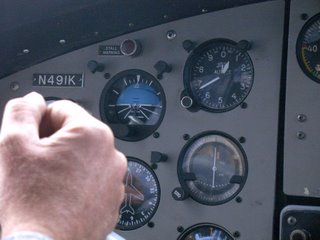 hauled a full load of passengers and gear 30 minutes to King Salmon and the end of our adventure.
hauled a full load of passengers and gear 30 minutes to King Salmon and the end of our adventure.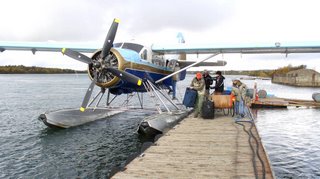
Very high my priority list for the 20 hours spent in quasi-civilization before flying on to Anchorage were two expereiences: eat Mexican food and sip a diet Coke. I only got one.
 Nacho Mama’s was of course closed so myself and a gang of parkies settled for pizza at D & D’s restaurant in the nearby town of Naknek. Thankfully D & D’s was able to provide the caffeine fix.
Nacho Mama’s was of course closed so myself and a gang of parkies settled for pizza at D & D’s restaurant in the nearby town of Naknek. Thankfully D & D’s was able to provide the caffeine fix.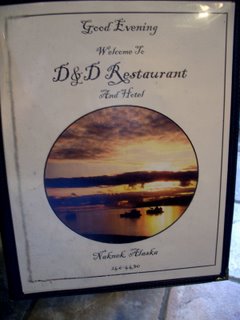
Already Brooks Camp seems like a dream, or rather a nightmare with a happy ending. We worked around giant carnivores all summer without being eaten. Despite our being absent, day use visitors will continue to watch bears
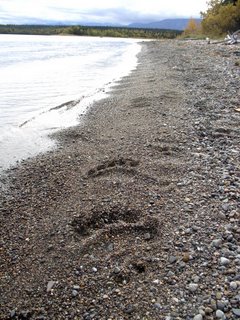 walk the Naknek Lake beach,
walk the Naknek Lake beach, 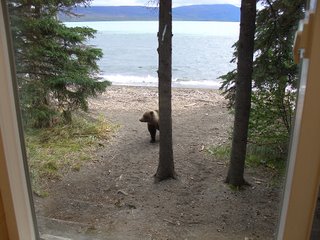 trespass into Brooks Camp, and swim Brooks River for perhaps another month.
trespass into Brooks Camp, and swim Brooks River for perhaps another month. 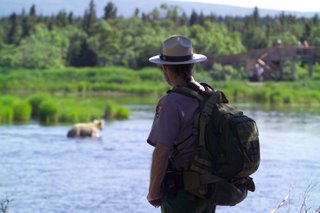 They will do so without the naturalist staff to watch for bears and conduct bear school.
They will do so without the naturalist staff to watch for bears and conduct bear school.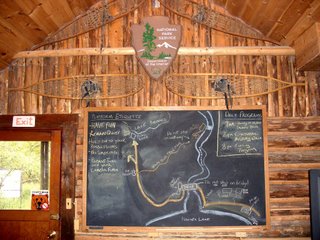
If they can do it without us, why are we there? I often wonder about the value of my work. When budgets are cut, interpretation is the first to go. The bad guys must be caught, the plumbing fixed, and the bathrooms cleaned, but naturalist programs are a luxury. When they are cut or reduced, the public does not complain much, at least to me. A tiny fraction of park visitors take the time to attend the formal programs that we do offer. Are we unnecessary?
In the short run, yes we are. In addition to formal programs, at Brooks Camp we staff the visitor center, offer bear school, and perform human traffic control in heavy bear use areas. Aside from the programs, people can perform all of these functions with neither knowledge of the significance of Katmai nor skill in conveying it. Without naturalists, visitors still would be able to buy t-shirts and postcards, learn bear etiquette, and have help negotiating the bear minefield.
In the long run, though, I believe we naturalists are critical to the NPS mission of conservation and enjoyment, in that order, that Congress mandates. Others can show visitors a good time—fishing guides and lodge operators for example. NPS interpreters do it while reminding folks that National Parks are special places to be protected for future generations and for the sake of the place itself.

I truly believe that without interpretive staff that national parks eventually would degenerate into something like county parks, used and abused. Moreover, should any administration seek to exploit the parks I think I can count on at least a couple of people who have attended my programs to stand up and say NO! Multiply that by the number of interpreters offering programs nationwide and you have a constituency. Yes, constituency building is perhaps our most important function, with benefits to bears and bear viewers long after the naturalists have gone.
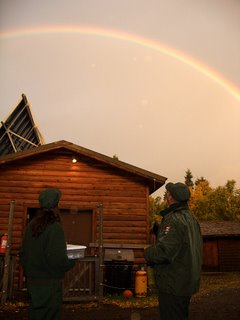
.jpg)

0 Comments:
Post a Comment
<< Home